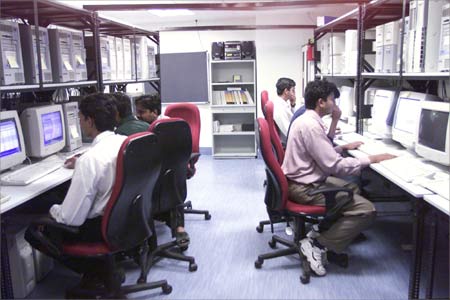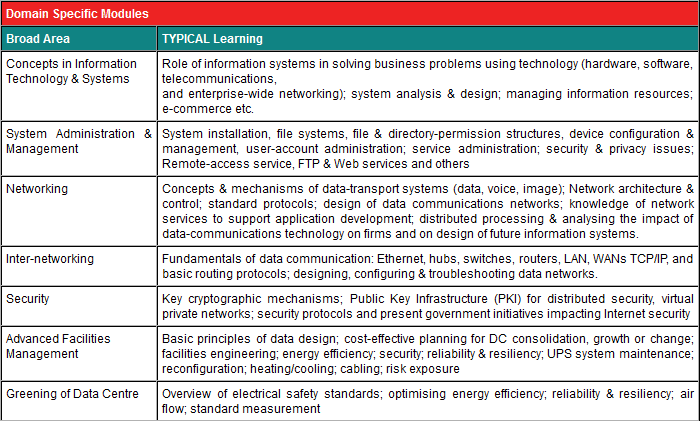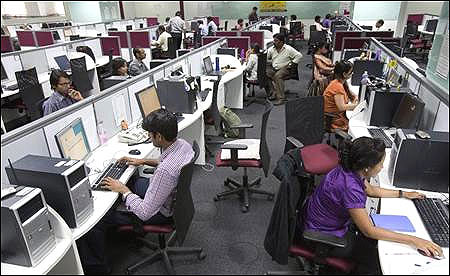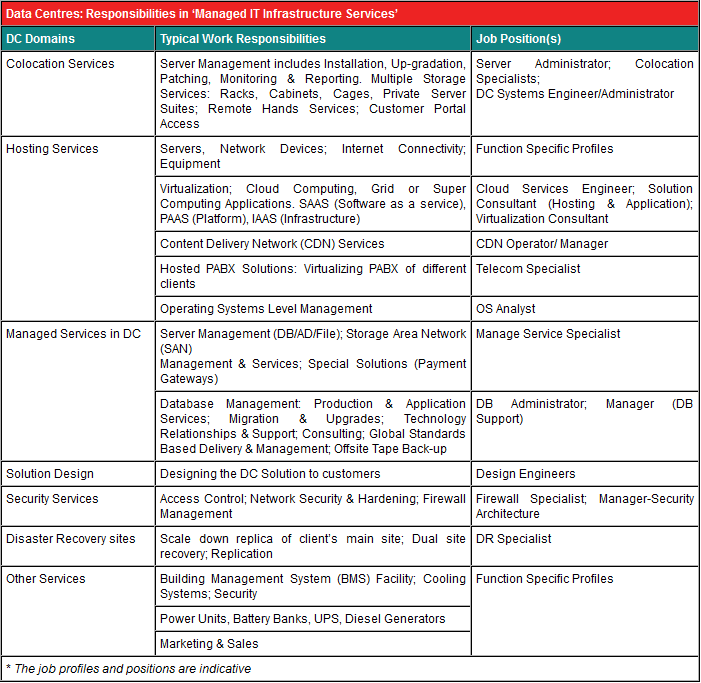Photographs: Reuters Nimesh Chandra, Careers360
Science and engineering professionals working in data centres are key assets for a country's economic stability and security. Focused programmes and adequate attention to traditional educational programmes will help build a pool of skilled people.
When Lemon Tree Hotels partnered with Tata Communications, they were able to implement a streamlined, scalable Virtual Private Network (VPN) solution.
The network specialist at Tata Communications' Data Centre was responsible for successfully planning the process and keeping the client happy, as even today, they continue to reap the benefits of a secure and reliable service, which provides dedicated hosting and storage solutions.
Demand for data centres and people
With Cloud Computing set to dominate the future, more professionals like network specialists will be needed to work in data centres, which process and disseminate on demand and in real time, incredibly huge amounts of data storage.
As on date, few companies own data centres (DCs), primarily due to the costs involved. But with the passage of time, more and more companies will start outsourcing their data storage, data usage and data security needs.
And the number of high-capacity data centres, which require professionals capable of seamlessly delivering bandwidth-hungry content and applications, will increase. Besides this core activity, DCs are likely to manage and create a host of value-added services such as Content Delivery Network (CDN) Service or Concierge Service (handling reservations and scheduling).
This would require people who are not only technically competent but are more creative and open-minded.
Please click NEXT to continue reading...
Why do we need data centres?
Image: Indian professionals at a data centre in HyderabadPhotographs: Reuters
Data centres help in meeting business and market needs, thus ensuring minimised IT risks and improved predictability for organisations.
The primary benefit is low cost of ownership of data, quicker deployment of services, and a comprehensive monitoring and security of data thus ensuring peace of mind. DCs also provide carrier diversity to support redundancy needs.
Any DC would essentially provide managed IT infrastructure services that includes colocation, managed hosting and storage, managed security services, customer delivery services and contact centres. The add-on services at DCs are much sought after.
"We are able to support cloud and grid computing, super computing applications that need high power density as well as the traditional data storage and data back-up," says Simon Taylor, Chairman of Next Generation Data Centre at Cardiff in Wales, United Kingdom.
The other reason to opt for DCs is the frequent network attacks both known and unidentifiable in the IT space. Attacks such as Nimda, Code Red, Welchworm Nachi, Sobig or Blaster have time and again shown how vulnerable data can be.
With more intelligent and complex attacks, not many firms are able to invest in building a multi-layer detection system to counter network and application layer attacks. The DCs are able to develop a firewall as a defence tool since more attacks are now at the application level.
These are dealt professionally even while providing access controls to the client if one makes use of a shared firewall and a shared IP service. Most of the DCs are carrier neutral, thus ensuring privacy and safety.
Why the future looks bright for India
Image: With companies like CtrlS, Reliance, Tata, Airtel and Sify expanding their DC businesses, experts predict that the market will grow steadily.Photographs: Rediff Archives
In this interview, T Muralidharan, Founder and Chairman, TMI e2E Academy tells us more about the scope of pursuing data management as a career.
How would you compare Indian data centres to those abroad?
They match global standards. With companies like CtrlS, Reliance, Tata, Airtel and Sify expanding their DC businesses, the future looks bright. Presently, the Indian DC services market is projected to grow at a 23 per cent CAGR till 2012. India remains one of the most preferred locations for DCs owing to cost benefits and sustainability of operations.
However, in 'Data Centre Risk Index', the latest report by Cushman & Wakefield and Hurleypalmerflatt, India scored an unsurprising second position in the most risk-ridden DC location among top 30 nations adding concerns over its position of global outsourcing.
Which domains, say in Managed IT Services, have a greater scope?
Telecom and BFSI (Banking, Financial Services and Insurance) play a pivotal role in India, when it comes to businesses driven by data centre. However, new sources like social media, manufacturing segments, enterprise applications are churning out huge volume of data.
How's the career path in DCs?
With the increase in the requirement of database architecture, the need of IT/engineering professionals for the role of DC engineers/technicians are increasing. In general, DCs prefer people with four to six years of IT experience in server management, security, storage systems etc.
Initially, DC offers roles like support and design engineers. These professionals work on managing a specific technology such as storage area network or firewall.
With experience, one moves up to become a DC designer. The designers begin with focus on one aspect of DC and later on design the entire DC. Looking beyond, one is also well-positioned for other IT management jobs like network operations, centre manager etc.
What does a data manager actually do?
Image: Skilled data managers are hired across sectors.Photographs: Rediff Archives
The set-up
A DC, typically set up in prime locations for easy accessibility, has a physical infrastructure that comprises storage area to house the client's equipment.
Most of the equipment is often in the form of servers mounted in rack cabinets, usually placed in single rows, thus forming aisles so that one can access the front and rear of each cabinet. The servers vary greatly in size from one rack unit (1-U) to large storage silos.
The DC also has a 'work area' which is the space for customer work zone and usually has an extended stage room used for spares and pre-configuration tasks; packing, unpacking etc. The other crucial set-ups in a DC are a 'network area'; 'cooling zone' (HVAC); and a 'power and generator area'. DCs today, are built with due consideration towards meeting global standards such as TIER-III/Tier-IV or Telecommunications Industry Association (TIA 942).
These, in common parlance, mean that the racks have a standard area; there is a clear height between floor and false ceiling; compliance with power and energy usage standards, temperature and humidity control; public address system etc.
The key functions in a DC include planning and designing to deployment of resources and handling the operations -- all related to data storage and its access. A growing demand these days is seen in developing expertise in analysing data storage. The above functions can be broadly classified in terms of services, facility, security and environment control.
Big corporations like Google, Facebook, Symantec, Microsoft, Amazon and IDFC, have their own data centres, usually at multiple locations.
Any DC would essentially provide managed IT infrastructure services that comprise the following:
Colocation Services: A DC offers racks, cabinets and cages, cross-connects, remote hands services and private server suites. The intellectual property (IP) and network services and managed security services are usually complementary once a company registers for storage services and buys space in the form of racks, cabinets and cages.
Hosting Services: These relate to servers, security, network devices etc and also advance features' support such as virtualisation and database management, dual site recovery, replication services, Operating Systems level management (Linux, Solaris, MS Windows, IBM AIX), 24x7x365 operations, monitoring, customer portal access and so on.
For Internet connectivity, network services are provided that include IP, MPLS, Ethernet WAN for both DC and end sites. Any good DC's specification usually complies with 100 per cent network and power uptime.
Storage Services:
These include multiple storage services options and facilities for storing client's equipment, Storage Area Network (SAN) services, technology relationships and support, standards-based delivery and management which are all integrated with a high performance global network.Other Services: For facilities, the services involve setting up of HT/LT Panel (high/low tension), uninterrupted power supply (UPS), battery banks; and generators to ensure 24x7 operations with remote hand support.
Further, for security, which is one of the most critical issues surrounding DCs, the services include providing physical security and access control, fire fighting, monitoring through closed-circuit TVs and digital recording. There are multiple levels of e-security with biometric access these days. Most of these services come under Building Management System (BMS).
Job opportunities at Data Centres
Professionals needed are in high-end computing (both cloud and grid) that demand qualification and experience in electronics and communication, computer or systems engineering and management.
One could also have an MSc in Computer, IT or Systems. Jobs in DC are also in areas such as technical supervision, facility monitoring, cabling etc.
To put it simply, there is a demand for skilled people in systems, virtual environment, power and capacity management. According to experts there is a greater need for people in DC planning and intelligence.
Typically, you may be working as DC manager or engineer, IT-infrastructure Monitor/Manager, Network Specialist, Facility Analyst, Sales Engineer, Technical Solutions Manager or Domain Specialist. The positions also include SAAS Administrator, Cloud Support Professional, Windows Administrator, Server Administrator among others.
Eligibility and skills
At the entry level in technical management of a DC, one should typically have a BE/BTech, or BSc/MSc in computers or electronics.
Depending on the nature of work, a good understanding of the domain is needed. Say for Cloud Support, one should know about cloud panels and different hypervisiors (hardware virtualisation) or for a job position such as Windows Administrator, one should be acquainted with Windows server administration and preferably be a qualified MCSA/MCSE.
You should also be well-versed with operating systems such as Windows, Red Hat Enterprise Linux or RHEL, Ubuntu. It is important that you have a fair knowledge on storage technologies and RAID levels (redundant array of independent disks) and have considerable command on hardware, servers, and networking.
Growth prospects, challenges and more...
Photographs: Reuters
Apart from a regular pay package that stands at around Rs 4 to 5 lakhs per annum at the entry point (say for a domain specialist) to much higher levels depending on the years of experience and specialisation, there are other benefits such as project incentives, surplus variable pay scheme and quarterly/annual rewards.
"But more satisfying is the work environment and innovative projects that keep you energised," says Kunal Awasthi who works at a private DC in Mumbai.
"The excitement at DCs overseas is quite different as every day brings new learning to you," says a young executive on the DC team of a hospitality software firm in Singapore.
He adds, "The DCs worldwide are quite engaging -- from cool ones like Roubaix 4 in France with 35,000 server capacity or SoftLayer, DAL05 at Dallas (20,000 servers), there are specialised centres like NJ2 at New Jersey, housing trading engines of several large financial exchanges where clients keep their servers in secure cages."
Challenges for DC professionals
A key area that requires attention is the growing focus on the need for Data Centre Infrastructure Management (DCIM) software which caters to the critical and not so critical needs in a DC.
For instance, a software, if it is able to give on a screen an operational dashboard showing details about power, space and cooling utilisation in a DC or the distribution of work and assets -- it makes things very easy for a DC professional to assess the shortcomings and how to increase the effectiveness of processes. Another area is the optimum utilisation of power.
With so many servers in a DC, the average utilisation of servers (as per studies), is one-fifth of the total capacity. In other words, most of the time the servers remain idle or are busy in the range of 5 to 35% of the time, though they still consume power. Thus it is a test for DC professionals to reduce wastage and work towards enhancing Power Usage Effectiveness (PUE).
Data centres getting smaller?
Owing to the rising energy and real estate costs, the trend is smaller DCs than mega ones. With recognition of virtualisation that pools in computing and networking resources and reallocates the same as per demand, smaller DCs make sense.
This approach promises greater utilisation rate for equipment. And as more firms opt for building their own, but smaller DCs, demand for skilled professionals is sure to go up.








Comment
article